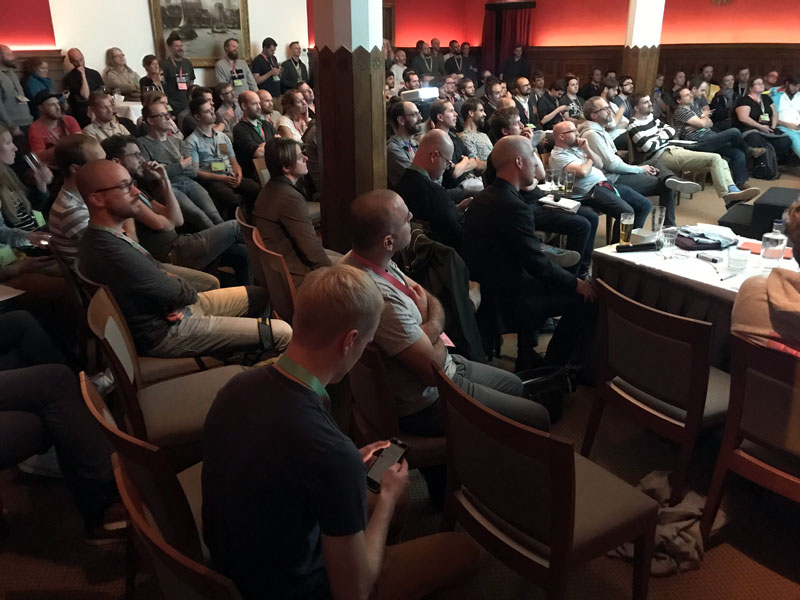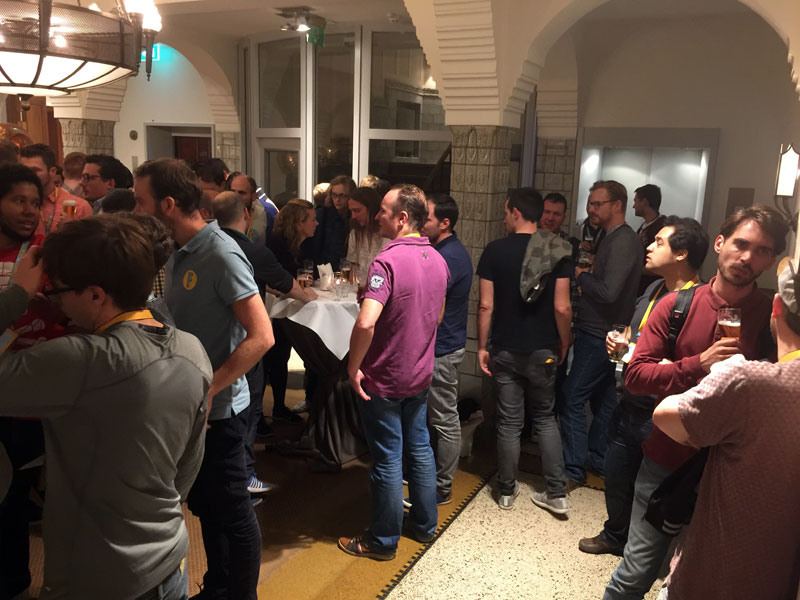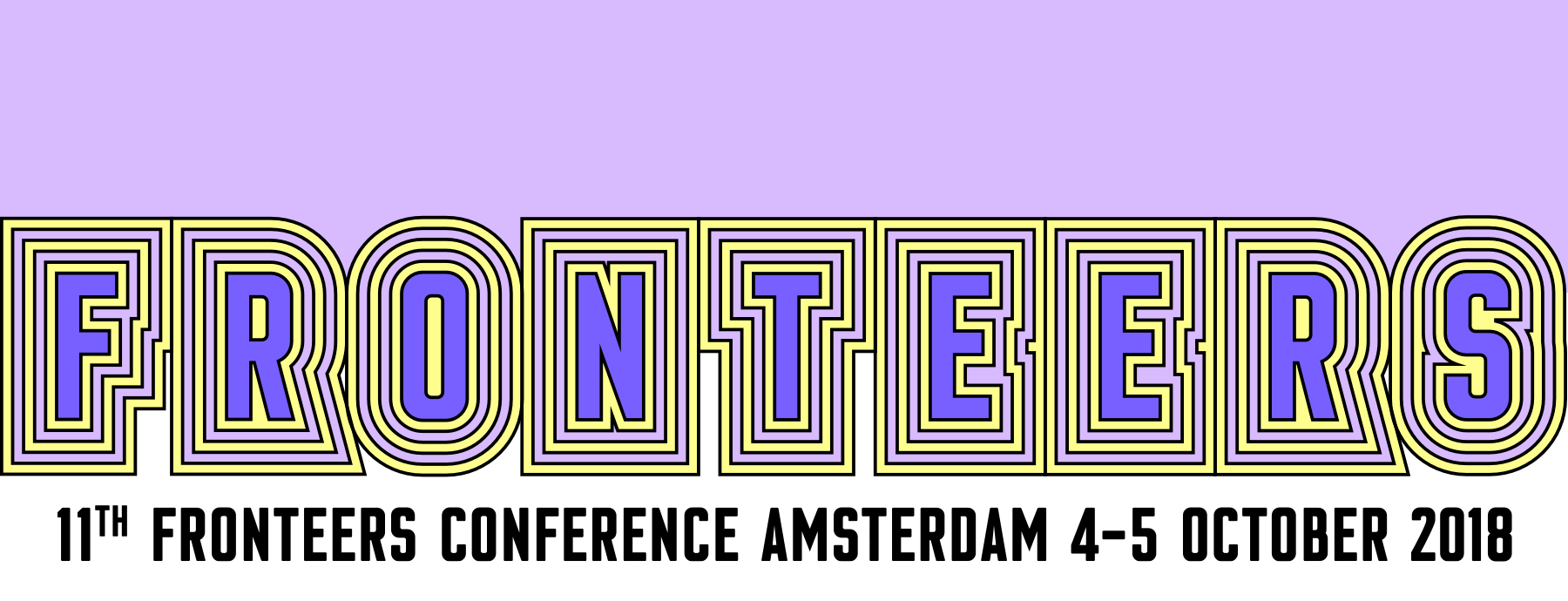Fronteers 2018 Jam Session

Many years ago, no longer invited to the speakers dinner, Anne van Kesteren and Koen Willems were really pissed off. And since they were already in Amsterdam the night before the conference and had nothing else to do, they rented a bar, organised a handful of short talks, gave a big party and presented the beer bill to Fronteers.
That was the birth of a tradition.
Now we proudly announce the
Fronteers Jam Session, 2018 Edition
It will be the ninth version in a row!
It's Fronteers Conference's annual evening of lightning talks for and from the community.
Koen Willems and Job van Achterberg will curate a list of 10-minute-long, rip-roaring, rabble-rousing, front-ending lightning talks.
Previous Jam Sessions were noisy, hot and steamy. This one might be too.
| What | Jam Session |
|---|---|
| When | Thursday, October 4th |
| Where | Stadhouderskade 5, 1054 ES Amsterdam, see the map below |
| Venue | People’s Place |
| Open | Jam Session starts at 20:30 |
| Closed | 00:30 |
| Bring | your conference badge |
Talks, drinks and no music
This thursday night venue is People's Place, nearby the venue of the conference. We're renting the entire building, so next to the Jam Session auditorium, we'll be hosting our familiar Thursday night social drinks, without background music.
See the map below for the exact location.

This year's speakers
'The importance of being prepared' by Jaco Koster
Since the introduction of Agile methodologies, i have met a lot of developers with a profound allergy of upfront design. While it is true that the waterfall days have been largely over, the need for some upfront design has never been higher. I will show why it helps to take a little bit of time to save the world from a project that noone wants to work on in the future.
'ESNext: Proposals to look forward to' by Bramus
In this talk I'll highlight some of my personal favorite ESNext proposals, selected from the current proposals that are not part of the ECMAScript specification (yet). A quick glance of TC39 and it's process will also be touched.
'Is your code adorable or odorable?' by Rowdy Rabouw
Every day we compose many of lines of code. Working code, but often poorly written code. Smelly code actually. Smelly, stinky code is hard to maintain and will eventually slow down your productivity and joy.
Applying the right principles, patterns and practices will improve your code. It will make it easier to work as a team and manage it in the future. Together with useful tooling it will empower you to write clean and appealing code.
'Instant WebXR, just add browser' by Ruben van der Leun
Last year, I gave a talk about WebVR, and in the intervening months, there's been a number of cool developments, and I would like to give a quick update on what's been happening.
In the talk, I would like to highlight the upcoming WebXR API functionality in browsers, give a quick look at what Amazon Sumerian is capable of(Avatars you can talk to!), as well as Facebook's React-360 which works exceptionally well with the Oculus Go.
'More than showing up: Being a better mentor for open-source' by Jennifer Geacone-Cruz
More than ever there are some amazing opportunities to get excellent mentoring for technologists of all types. And more than ever, there are some fantastic chances for open-source projects to get more people involved, and for technologists to share their knowledge. But let's face it... mentoring isn't easy.
I've been a mentor for Rails Girls Summer of Code since 2015 with my open source project LivingStyleGuide/PIMD, as well as with incubator programmes like the Baltic region's Startup Wise Guys and one-on-one mentoring with students. Participating in these wonderful programmes and relationships, I realised there's not always a lot of talk about or preparation around some of the more personal aspects of mentoring. I've found my background in psychology and teaching to be invaluable to helping me critically look at how I can be a better mentor and facilitate knowledge sharing, and I would love to share some of these learnings with my peers.
In this short talk, I'll be looking at some lesser-discussed aspects of mentoring that go beyond applied technical knowledge. We'll be looking at some points originating in learning psychology and educational techniques — including finer points of impostor syndrome, confidence-building, communication, and capitalising on diverse competencies — that can help us all be a better mentors to keep the open-source community a welcoming, growing, thriving, diverse, and inclusive place.
'Advanced Techniques for Web-Based Comics' by Rachel Nabors
Flash is dead! But interactive storytelling isn't. This quick talk covers the state of motion comics, visual novels, and interactive games—and what's stopping their creators from taking over the Internet!
'Variable Fonts' by Arjan Eising
A brief introduction to the characteristics of variable fonts.
'Turtles all the way down' by Niels Leenheer
Every image you use on your website is a request to the server. And I think somebody once told me that we should use as few requests as possible. Yes, that sounds about right. So what if we could embed images right in your HTML? That would make our website load at least twice as fast and reduce requests by... five. Probably. Okay, we can already do that with DataURLs. But what if we couldn't?
'Semantics for Cynics' by Vadim Makeev
Okay Google: why do I need semantics and tags apart from <div>? I don’t give a damn about specs or making “what’s right”, I think inmates are in charge of web standards asylum and CSS for me is Client Side Scripting. My <Link/> with onclick is hundred times easier than <a> or <button> dilemma. Only useful tags and markup practices without myths and fairy tales for true full-stacks.
'You might not need Webpack (the past present and future of modular JavaScript)' by Joël Kuijten
I thought it would be nice to talk about modular JavaScript. How it all came to be and why. Give an overview of the history of JavaScript modules, from <script> to namespaces to IIFE to CommonJS to AMD to UMD to ES2015 module syntax to finally ECMAScript modules and module loading. Highlight the pros and cons of them all and touch on what might come in the future.
'WebBluetooth and Thingy52' by Lars Knudsen
A quick hands-on talk about the cool possibilities of WebBluetooth (to complement Kenneth's talk) and the use of Thingy52 from Nordic Semiconductor as a great first choice for developers who want to explore WebBluetooth and sensor/actuator interaction. I will bring a bunch for handouts.
SVG vs. Everybody by Joshua Giowaya
SVG may have been overlooked in the past due to poor browser support, however, SVG1.1 is now fully supported in all evergreen browsers. SVG are crisp on any screen, responsive by nature and is seriously cool, with nifty features like grouping, stoke and fill, and filters. Oh and the ability to easily animate, Who doesn't love a good SVG animation?
Even if you’ve never used SVG before, come learn how to get started with this amazing element. We’ll see what all those features actually do, we’ll look at how all that code in a SVG file draws a shape, and best practices for formatting you SVG code.

